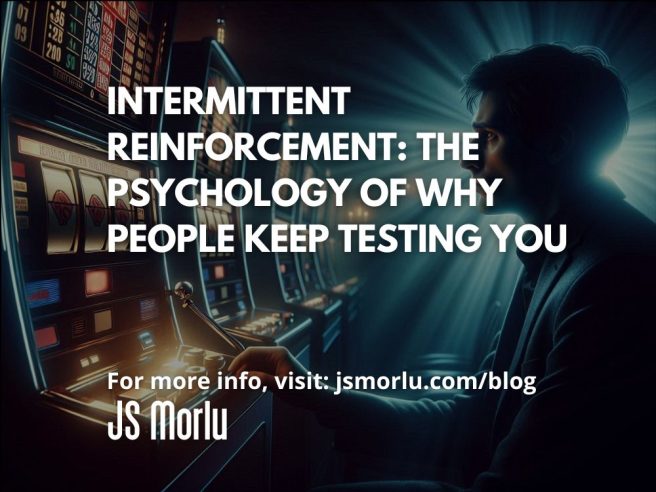By: John S. Morlu II, CPA
There’s a fascinating — and slightly infuriating — psychological phenomenon that explains almost every repetitive, draining human dynamic you’ve ever been trapped in.
Why your underperforming employee keeps promising to improve.
Why your ex texts “Hey stranger” after three months of silence.
Why you check your phone every five minutes like it owes you money.
And why some people only act right when they sense you’re about to walk away.
It’s called intermittent reinforcement.
In simple terms:
If you say “no” ten times but say “yes” once — congratulations, you’ve just taught the other person to ignore the first ten.
If you give in after holding your ground, you didn’t set a boundary — you started a game.
And worse, you turned yourself into the jackpot.
1. The Casino Principle: Why Humans Are Addicted to “Maybe”
Casinos have known about this psychology for decades.
They don’t make you win every time — that would get boring.
They make you win sometimes.
The occasional reward keeps your brain guessing. The uncertainty fuels hope.
You pull the lever again and again, not because of the guaranteed payout — but because it might happen this time.
Now swap the slot machine for a manipulative colleague, partner, or friend.
They disappoint you nine times out of ten but occasionally say something nice, do something kind, or deliver a miracle right when you were about to quit.
And you think, “See? They’re not all bad.”
That little “maybe” keeps you emotionally gambling.
You’re not in a relationship or a workplace anymore — you’re in a casino with feelings.
And the house always wins.
2. The Workplace Edition: The Employee Who “Quits” Every Quarter
Every manager eventually meets a master of the “strategic resignation.”
They don’t actually want to leave.
They just want to see how much chaos they can cause when they say they’re leaving.
They quit loudly. They send emotional messages. They act like martyrs of mistreatment.
But deep down, they’re watching your reaction like poker players reading your face.
If you beg them to stay — they’ve won.
If you soften your tone — they’ve won.
If you delay the consequences — they’ve hit the jackpot.
This is intermittent reinforcement at work: the employee learns that throwing emotional grenades pays off.
They can underperform for weeks, vanish on Fridays, and miss deadlines — but as long as they cry “stress” once a quarter, you’ll reset the clock.
They don’t respect your rules; they’re testing your limits.
And every time you forgive them without consequence, you teach them that chaos has no price tag.
3. Relationship Edition: Emotional Roulette and the Power of “Sometimes”
In dating, intermittent reinforcement is the entire business model of modern heartbreak.
That’s why ghosters, hot-and-cold partners, and commitment-phobic charmers keep people hooked like unpaid interns of emotional chaos.
You get affection one day and silence the next.
They apologize on Monday, disappear on Tuesday, resurface on Friday with a meme, and act like nothing happened.
You should block them, but the next time they show up with a decent explanation and a little warmth, you think, “Maybe they’ve changed.”
Spoiler: They haven’t.
You’re not in love. You’re neurologically addicted.
Psychologists found that unpredictable rewards — like random compliments, surprise texts, or “love-bombing” followed by distance — cause more dopamine release than predictable consistency.
Your brain becomes a lab rat pressing the lever for emotional crumbs.
Inconsistent affection is the strongest drug known to human relationships — because your brain keeps chasing the high of “maybe this time.”
That’s not love. That’s a Vegas slot machine with Wi-Fi.
4. Leadership Edition: The CEO Who Finally Said “No”
Every strong leader eventually faces the moment where compassion starts to blur into enabling.
You begin with empathy — you want to understand your people, give second chances, show grace.
But then, the same faces keep showing up late. The same excuses keep arriving in different fonts.
You start realizing: you’re managing emotions, not performance.
When you let someone miss three deadlines and still give them “one more chance,” you’ve just created a new company policy — failure with benefits.
It’s no longer about fairness; it’s about fatigue.
You let it slide because you’re tired, not because it’s right.
And tired leaders make emotional deals they regret later.
Intermittent reinforcement in leadership looks like this:
- You discipline once but ignore it next time.
- You warn them but never follow through.
- You say “this is the last time” — six times.
Eventually, your words lose power.
Your authority becomes background noise.
One executive once told me:
“If you let someone get away with it once, you’ve taught them that your boundary is a suggestion.”
Leaders don’t fail because they’re too kind — they fail because they reward inconsistency.
5. The Family Version: The Candy Store of Chaos
If you’ve ever seen a child throw a tantrum in a supermarket, you’ve witnessed a PhD-level demonstration of intermittent reinforcement.
Mom says “no candy.”
Kid screams.
Mom holds firm.
Kid screams louder.
Mom gives in.
Peace returns.
For now.
But what did the kid just learn?
That persistence beats principle.
And the next time they want something, they’ll scream longer — because they know the formula works.
The same mechanism applies in adulthood.
When people realize that emotional escalation gets them what they want — they keep escalating.
It’s not immaturity; it’s conditioning.
That’s why manipulation isn’t always malicious. It’s often learned.
People repeat what once worked — until someone finally stops rewarding it.
6. The Science of Surrender: Why “Maybe” Hijacks Your Brain
B.F. Skinner, the father of operant conditioning, ran a famous experiment with pigeons.
He put them in a box with a button.
- If pressing it always gave food, the pigeons pressed occasionally.
- If pressing it never gave food, they stopped.
- But if pressing it sometimes gave food, they went crazy pressing it nonstop.
Sound familiar?
Replace the pigeons with people, and the food with attention, praise, or approval — and you’ve got human behavior in 2025.
Social media runs on this same principle.
You don’t get likes every time you post — just sometimes.
That unpredictability keeps you posting.
Every “maybe” is a hit of dopamine.
It’s not just relationships or workplaces — it’s our entire culture.
We’ve become pigeons with Wi-Fi and self-doubt.
7. How to Break the Cycle (Before It Breaks You)
Here’s the hard truth: you can’t break intermittent reinforcement with logic — only with consistency.
You have to make your “no” mean no even when you feel guilty.
You have to hold the boundary even when it costs you comfort.
You have to realize that peace without principles is just delayed chaos.
- The first time someone tests you, it’s data.
- The second time, it’s confirmation.
- The third time, it’s your fault.
Consistency is the most loving thing you can give — to others and to yourself.
Because when your rules are clear, your relationships stop being games.
And if you want loyalty, focus, and respect — stop negotiating with inconsistency.
8. The Humor in It All: We’ve All Been the Pigeon
Let’s be honest.
We’ve all been there — rationalizing, forgiving, checking, hoping, spinning the emotional roulette wheel.
We’ve all told ourselves, “This time will be different,” while knowing deep down it probably won’t.
We’ve all been the boss who says, “I’ll deal with it after the holidays.”
The partner who says, “He just needs space.”
The parent who says, “It’s only candy.”
We all fall for it — because we all want to believe people will change if we just give them one more chance.
And sometimes they do.
But most times, they just get better at timing their apologies.
9. The Punchline: Consistency Is the New Power Move
Here’s the uncomfortable truth:
If you give in once, you’ve told people that your boundaries are for negotiation.
If you stay consistent, you’ve told them your boundaries are your identity.
The people who really value you will adjust.
The ones who were exploiting the gaps will disappear.
So whether you’re a CEO, a friend, or just someone trying to protect your peace — remember:
Intermittent reinforcement is how people learn to test you.
Consistency is how they learn to respect you.
And if you ever forget that, go spend 10 minutes in a casino.
You’ll see thousands of people paying for hope — when all they needed was discipline.
Because at the end of the day, the world doesn’t reward people who say “yes” the most.
It rewards those who mean what they say — and never pull the lever twice.
Author: John S. Morlu II, CPA is the CEO and Chief Strategist of JS Morlu, leads a globally recognized public accounting and management consultancy firm. Under his visionary leadership, JS Morlu has become a pioneer in developing cutting-edge technologies across B2B, B2C, P2P, and B2G verticals. The firm’s groundbreaking innovations include AI-powered reconciliation software (ReckSoft.com) and advanced cloud accounting solutions (FinovatePro.com), setting new industry standards for efficiency, accuracy, and technological excellence.
JS Morlu LLC is a top-tier accounting firm based in Woodbridge, Virginia, with a team of highly experienced and qualified CPAs and business advisors. We are dedicated to providing comprehensive accounting, tax, and business advisory services to clients throughout the Washington, D.C. Metro Area and the surrounding regions. With over a decade of experience, we have cultivated a deep understanding of our clients’ needs and aspirations. We recognize that our clients seek more than just value-added accounting services; they seek a trusted partner who can guide them towards achieving their business goals and personal financial well-being.
Talk to us || What our clients says about us






